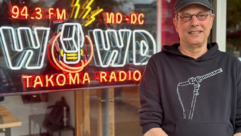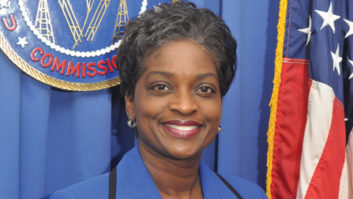Despite Enforcement Actions and Legalized LPFM, Hundreds of Unlicensed Stations Remain on the Air
WASHINGTON The struggle over access to the public airwaves rages on between unlicensed broadcasters and the FCC.
In spite of crackdowns by commission field agents, the “free radio” movement is as active as ever. In rural areas, mid-sized cities and urban markets throughout the country, experts say hundreds of unlicensed operators are transmitting unauthorized signals.
Call it a clash between the establishment and the disenfranchised, or call it a matter of enforcing the law. But this battle is nothing new. For years, pirate broadcasters have operated stations in unclaimed areas of the FM band or in parts of the spectrum where they interfere with licensed broadcasters.
Recently, the movement has seen change. While some pirates still simply disdain the regulatory authority of the FCC, others now excuse their acts of civil disobedience by claiming they have been shut out of the legal low-power FM class.
Some free-radio operators did not apply to the commission for an LPFM license because frequencies were not available in their community. Others were eliminated because they were not given amnesty for their pirate activities, according to Pete Tridish, a former Philadelphia-based pirate who serves as a staffer at Prometheus Radio Project, a nonprofit organization that helps launch LPFM broadcasters.
Since the process to legalize the low-power class began more than two years ago, the subsequent lockout of all pirates from the new service has led to a split among free-radio advocates.
Some, like Tridish, dove into LPFM while others continue to broadcast illegally.
No rehab
Tridish believes the most recent rise of the free-radio movement began in 1987 when Mbanna Kantako, a legally blind man, launched an unlicensed station in his Springfield, Ill., housing project on 106.7 MHz.
Fined by the FCC multiple times, the station, Human Rights Radio, still is broadcasting without a license. Kantako has refused to pay the fines, Tridish said.
In the 1990s, others followed Kantako’s example of unlicensed broadcasting. Hundreds of stations popped up around the country. The FCC shut down many of these illegal operators, but the issue of community radio took a higher profile.
In 1999, then-FCC Chairman William Kennard proposed a new class of lower-power FM stations, arguing that they would offer more diversity and more access to local groups that were unable to get on the airwaves otherwise.
Some participants believe that, having grown into a nationwide civil disobedience campaign against what they view as corporate control of the airwaves, micropower broadcasters were the catalyst that spurred the LPFM initiative. The FCC did so, according to this school of thought, in order to assert its control of the airwaves and divide the free-radio movement.
When the agency proposed the LPFM rules in early 2000, the FCC intended to allow “rehabilitated” former pirates to apply for the new licenses. These rehabilitated applicants were defined as those who heeded Kennard’s call to halt broadcasting by February 1999 or after being instructed to do so by the commission.
But legislation passed by Congress later that year withdrew this provision and forbade anyone who had ever operated a pirate station from receiving an LPFM license. NAB saw this as a victory for existing owners, who didn’t want to see pirates rewarded for breaking the law.
The licensing issue continues to be debated in the courts. Last winter, a federal appeals court in Washington ruled that the ban on former pirates as LPFM operators is unconstitutional but decided that the FCC may reject pirates on a case-by-case basis. This May, the same circuit court agreed to rehear the case following a request by the FCC.
The FCC has yet to approve any LPFM applications filed by former pirates.
During the four application windows, the FCC collected roughly 3,000 applications for LPFM licenses. As of mid-June, the FCC had licensed 16 stations and granted 295 construction permits out of a pool of 600 applications accepted by the commission that did not conflict with other applications nor contain serious errors.
Seeking equal rights
Another issue is the number of legal LPFM licenses available. Congressionally-mandated interference protection rules, when applied, resulted in fewer LPFM allocations than advocates had hoped for.
This year, the FCC is expected to study whether third-adjacent-channel protections are actually needed for LPFM. If the protections are found to be unnecessary, more frequencies could become available.
Steven Dunifer, founder of pirate station Free Radio Berkeley, said the agency’s enforcement of the third-adjacent-channel protection rule is contradictory because full-power stations in urban areas have second-adjacent-channel protections.
“Low-power stations can’t be more of a problem,” he said. “What happened to equal protection under the law?”
Dunifer, who still uses the Free Radio Berkeley name, now creates equipment kits for low-watt stations and provides broadcast training. (Dunifer’s former station in Berkeley, Calif., reorganized and took on a different name after his injunction; it continues to broadcast.)
He believes the FCC’s regulatory structure does not comply with the First Amendment. His own case before the Ninth Circuit Court of Appeals, in which he challenged the FCC’s regulations for licensing low-power broadcasters, was rejected because he had never applied to the agency for a license or a waiver from licensing requirements. Dunifer is under a permanent injunction banning him from radio broadcasting. He said he still wants the commission to address those concerns.
C. Patrick Roberts, president of the Florida Association of Broadcasters, takes a different view on unlicensed broadcasters: Pirates have broken the law and should not be granted licenses by the FCC.
“These guys don’t care about power requirements at all,” he said.
Roberts’ state has had significant problems with unlicensed operators. For years, low-watt pirate stations have interfered with the signals of licensed broadcasters in parts of the Miami-Fort Lauderdale area.
As in any market, Florida lacks sufficient spectrum for everyone who would want a station license. But given the region’s terrain, low-watt pirate signals can travel far and pose interference for licensed FM broadcasters, he said.
“In a state that’s flat, the signal can go forever. There’s nothing to obstruct it.”
Though FCC engineers in that area monitor the situation and listener complaints are filed with the commission frequently, Roberts said it’s not easy to get a pirate off the air permanently. After being caught and having their equipment seized, he said, some pirates just start up in a new location using inexpensive equipment.
NAB spokesman Dennis Wharton said pirates around the country operate that way. “It’s a common problem that seems to have no end.”
Wharton said the NAB still believes unlicensed broadcasters have no right to use the public airwaves, especially in areas where they cause interference to licensed broadcasters or air traffic control towers.
Though there is no central data source on the number of pirates operating at any given time, Dunifer estimates hundreds of unlicensed stations are broadcasting in small towns and cities. The top urban markets, he said, are Los Angeles, New York, Chicago, Seattle and Atlanta.
If the FCC finds someone is violating the federal law against operating an unlicensed station, the agency’s Enforcement Bureau first issues a non-punitive letter to violators, asking them to stop operations. The commission reports that 90 percent of those operators halt broadcasts soon after receiving such a letter.
In May, the Enforcement Bureau announced that 300 unlicensed stations had been shut down in the last 18 months in the United States. In addition, pirates have been jailed and convicted of criminal charges.
In May 2001, New York-based pirate Ibar Mohamed was arrested for operating an unlicensed station in two boroughs. In September 2001, a Richmond, Va., pirate named Khalid Kubweza was convicted of operating a station from his home after allegedly ignoring repeated warnings.
So far in 2002, FCC field office personnel, working with the officials from local U.S. Attorneys offices, have shut down and seized the equipment of 12 to 15 violators who ignored the non-punitive letters asking them to stop broadcasting.
Other fish to fry
But for the FCC field offices, finding radio pirates is not the highest priority, according to an agency source. In recent years, staffs and budgets have been shrinking, and field agents are responsible for a host of other duties including homeland security.
Field agents monitor pirate activity in each region and do everything that is required, said the source, including teaming up with members of other federal agencies such as the U.S. Attorney’s Office and the U.S. Marshals Service to shut down pirates.
Most complaints are filed by listeners who experience interference from pirate stations when listening to a particular station, the source said. In addition, field agents find pirates by canvassing part of the bandwidth vulnerable to pirate activity or unoccupied frequencies in each region.
The source said pirates cover all types of programming and interest groups, including religious groups, right-wing militia and a small number of ethnic communities.
Groups do not need much capital to get started. For example, Dunifer designs, manufacturers and assembles broadcasting equipment kits, which cost $2,000 to $2,500. The kits include a transmitter/exciter, an amplifier, an antenna, dummy load, power supplies, meters, filters, mixers and microphones.
Dunifer also offers training for novice free-radio broadcasters interested in exercising their right to free speech. “It’s an ongoing effort to help grow a grass-roots media community,” he said.
Previously against LPFM, Dunifer now supports the choice because he believes it empowers communities and indicates that the FCC recognized the importance of community radio.
Like Dunifer, Tridish believes the need for community radio still needs to be addressed by the FCC.
“The people that are shut out of LPFM are still in the same position. The commission hasn’t done anything to address their rights,” he said. “I think that the commission will eventually have a problem on their hands because there is no legitimate way to start a radio station.”











